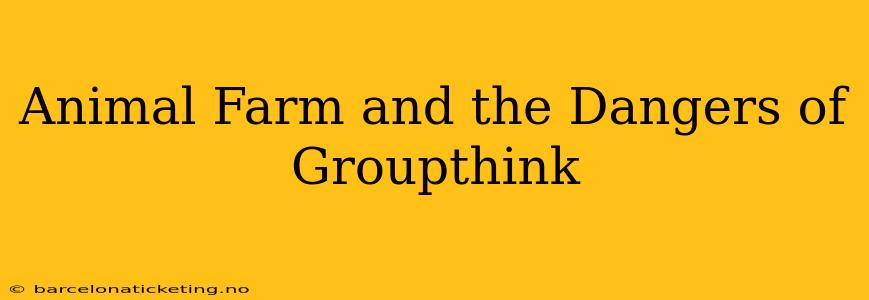George Orwell's Animal Farm, a satirical novella, is much more than a children's story; it's a chillingly relevant allegory exploring the dangers of totalitarianism and the insidious nature of groupthink. Published in 1945, its themes resonate powerfully today, serving as a cautionary tale against the seductive allure of unquestioning obedience and the erosion of individual thought. This essay will delve into how Orwell masterfully illustrates the dangers of groupthink within the context of the animal rebellion, exploring its devastating consequences and offering valuable lessons for understanding contemporary societal issues.
What is Groupthink, and How Does it Manifest in Animal Farm?
Groupthink, a psychological phenomenon, occurs when the desire for harmony or conformity within a group results in an irrational or dysfunctional decision-making outcome. Individual critical thinking is stifled, dissenting opinions are suppressed, and the group prioritizes consensus over objective analysis. In Animal Farm, this manifests almost immediately after the animals overthrow Farmer Jones. Initially united by their shared dream of a better life, the animals quickly fall prey to the manipulative rhetoric of the pigs, led by Napoleon and Squealer.
How does Napoleon use propaganda to manipulate the animals?
Napoleon's manipulation is a key element in fostering groupthink. He utilizes propaganda, carefully crafted speeches, and the rewriting of history to control the narrative and maintain his power. Squealer, his skilled propagandist, expertly twists facts, obfuscates the truth, and subtly alters the Seven Commandments – the core principles of Animalism – to justify Napoleon's increasingly tyrannical actions. The animals, lacking critical thinking skills and susceptible to emotional appeals, readily accept these revisions, reinforcing the groupthink mentality. The sheep, constantly bleating slogans like "Four legs good, two legs bad," epitomize unquestioning obedience, acting as a powerful symbol of the dangers of uncritical acceptance.
What are the consequences of groupthink in the novel?
The consequences of groupthink in Animal Farm are catastrophic. Individual animals lose their voices, their concerns are ignored, and dissent is brutally suppressed. Boxer, the hardworking cart-horse, embodies the tragic consequences of unwavering loyalty and blind faith. His unwavering commitment to the revolution, despite the escalating injustice, ultimately leads to his betrayal and demise. The animals’ initial hopes for equality and freedom are gradually eroded, replaced by a brutal dictatorship that mirrors the very system they sought to overthrow. The pigs, once equals, ultimately become indistinguishable from the humans they rebelled against, highlighting the cyclical nature of oppression when groupthink prevails.
Does the novel suggest ways to resist groupthink?
While the novel primarily illustrates the negative consequences of groupthink, it subtly suggests ways to resist it. Characters like Benjamin, the cynical donkey, represent a form of resistance through skepticism and independent thought. Although he doesn't actively challenge the pigs, his quiet observation and astute understanding of the unfolding events serve as a reminder of the importance of critical analysis. The novel, therefore, indirectly suggests that cultivating individual critical thinking, skepticism, and the courage to question authority are vital in resisting the seductive allure of groupthink.
Is Groupthink Relevant Today?
The dangers highlighted in Animal Farm are profoundly relevant to contemporary society. We see echoes of groupthink in various contexts, from political polarization and the spread of misinformation to corporate cultures that stifle dissent and prioritize conformity over innovation. The ease with which propaganda and misinformation can spread through social media further exacerbates the problem, making it crucial to cultivate critical thinking skills and media literacy. The novel serves as a timeless reminder of the importance of individual responsibility, the need for critical analysis, and the dangers of unquestioning obedience.
By understanding the mechanisms of groupthink as illustrated in Animal Farm, we can better equip ourselves to resist its insidious influence and protect the values of individual liberty and critical thought. The novel's enduring power lies not just in its captivating narrative, but in its potent warning against the dangers of unchecked power and the erosion of independent thought. It’s a book that demands to be reread and reinterpreted in light of contemporary events, serving as a constant reminder of the fragility of freedom and the importance of vigilant citizenship.

